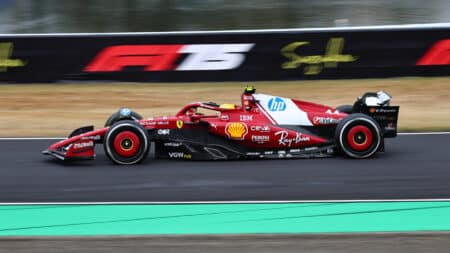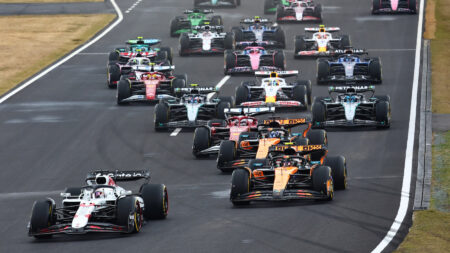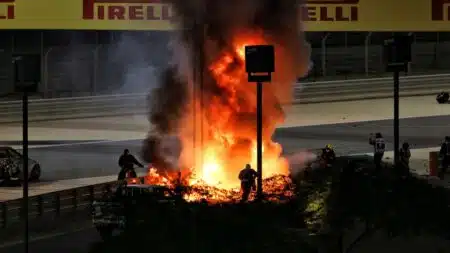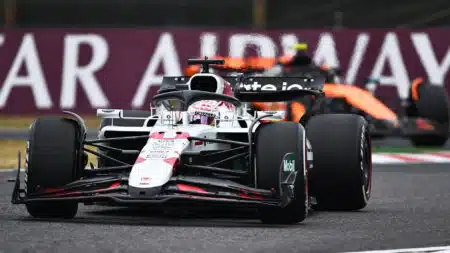
The Ferrari updates Hamilton hopes will fix his car problems in Bahrain
Ferrari is the Formula 1 team bringing the biggest update for its car in the Bahrain Grand Prix
If you’re good enough, you’re old enough. It’s an old motor racing cliché, but one that has rung true over the years for the likes of Kimi Räikkönen, Fernando Alonso, Lewis Hamilton and Sebastian Vettel when they graduated to Formula 1. But what about an 18-year-old Russian lacking any notable track record?
Sauber’s recent announcement that it plans to groom Sergey Sirotkin for a possible fast-track F1 debut next season was a popular talking point over the weekend of the Hungarian Grand Prix. Sirotkin, who turns 18 next month, is a little-known racer in Formula Renault 3.5 and comes as part of a much-needed new sponsorship deal with three government-backed Russian entities.
Lewis Hamilton’s pithy response to the age question was the choice quote on the subject. “I wasn’t ready at 18,” he said. “I was pretty good at 18, so…”
Now, if Sirotkin turns out to be another Lewis perhaps his age and lack of experience won’t matter. The trouble is, there’s no evidence to suggest he’s anywhere near the level of a future World Champion. Is this a case of gross irresponsibility from a team that is desperate for an injection of cash?
Sauber team principal Monisha Kaltenborn addressed that question when she explained the team’s position on Saturday morning.
“The key is to be fair to him,” she said. “We know our responsibilities to him. We have been in similar situations before, although not with such a young driver, but with drivers who have come from the series he is in now. We take that responsibility very seriously. He must fulfill certain criteria and we will do our best to help him do that. But the most important thing is that we are not out to harm him in any way. We’ll see how things go. We have to take it step by step.”
One significant problem to be overcome is that Sirotkin doesn’t yet qualify for an F1 superlicence. With the lack of testing opportunities in the current era, Sauber has its work cut out to train him to the required level. All Kaltenborn could say was: “We will find other ways to get him that mileage and make certain he is ready to race for us next year.”
In other words, she doesn’t have an answer to this one yet.
If Sirotkin doesn’t make the grade, Kaltenborn claims it won’t affect the sponsorship investment from Russia’s Investment Cooperation International Fund, the State Fund of Development of the North-West Russian Federation and the National Institute of Aviation Technologies.
“We have our contract in place and we are very happy and relieved,” she said. “We are now focusing on starting the implementation of this cooperation because it’s a very complex and comprehensive deal.
“There are three elements: one is a technology cooperation with both sides, bringing in their technology know-how to see what we can develop; the second part is preparing the driver Sergey Sirotkin to come into F1; and the third aspect is to assist where we can as a team to establish F1 in Russia with the [Sochi] race coming up next year.
“No one has ever said it relies only on the driver. We have to be very careful here. I know we haven’t communicated much at this stage, but we shouldn’t jump to certain conclusions. This is a long-term deal based on these three pillars. It’s not that they will just close if the driver doesn’t do well.”
Kaltenborn also batted away rumours that her own future at the team was in any doubt, likewise that of Nico Hülkenberg.
“I’m here and I plan to stay here,” she said. “Actually it’s never been an issue in our talks, so we don’t know where this is coming from. On Nico, we have announced him as our driver for this year and that is how it is going to stay. What we do next year we’ll announce at the right time.”
Running an independent team in F1 has never been more challenging than right now. Sauber’s financial plight is desperate, and frankly it shows.
The apparent return of the Austrian Grand Prix was another popular topic of conversation, following the announcement that the track formerly known as the A1-Ring will host a race next July. The site of the glorious old Ӧsterreichring is now known less evocatively as the Red Bull Ring in the wake of Dietrich Mateschitz’s acquisition and rejuvenation of the picturesque circuit that nestles in a corner of the Styrian mountains. According to colleagues who’ve visited it recently, the location and the track are little changed.
It’s funny how perspectives change. A dozen years ago, I remember looking forward to and enjoying the Austrian GP, but my enthusiasm wasn’t universally shared. As for the circuit, it was considered – quite rightly – a dim shadow of its wonderful former self.
But with the passing of time, affection for the place has taken root. We’ve seen something similar at the ‘new’ Nürburgring, which is no longer reviled as it once was when it opened 30 years ago. Indeed, modern drivers have described it as a ‘classic’ – Denis Jenkinson must be spinning…
In Austria’s case, that it’s also a rare comeback for a traditional European race is also a significant factor. Mark Webber expressed the most enthusiasm for its return, which perhaps is hardly surprising given his close relationship with Mateschitz.
“Absolutely brilliant,” he said. “I was really, really happy about it, to see us going back to a super-traditional venue. There have been so many Grands Prix there in the past. It’s a great little location, tucked away in the mountains. I know Dietrich is very proud of it and the timing is right for them to have a Grand Prix.
“Along with America, it’s one of the best additions we’ve had in the last few years. Obviously there are some that haven’t been super-strong, let’s say… But this one will work great. And for Austria, it’s a brilliant tonic, brilliant medicine for the country. It’s not easy in Europe at the moment.”
What a pity then that Webber won’t be racing there himself come July 2014. “It’s a shame it wasn’t a year early!” he said. “I really enjoy the track. Maybe I’ll go and watch. I’ll go to a few and maybe that’ll be one. And the schnapps always tastes good. I might oversleep and miss it…”
Click here to read more on Formula 1

Ferrari is the Formula 1 team bringing the biggest update for its car in the Bahrain Grand Prix

The FIA says engine manufacturers have committed to the planned 2026 rules, with some modifications

Over the years, the Bahrain Grand Prix has offered plenty of on-track - and some off-track - drama. These are the top controversies from the Sakhir event

The top three were covered by 2sec in the previous race, and big points were scored elsewhere – who's in your 2025 Bahrain GP Fantasy team? Here are our predictions; tips on drivers to avoid; which chips to play and further analysis